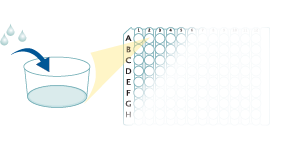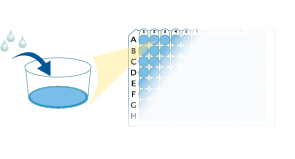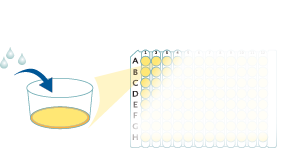Human Kallikrein 3/PSA Quantikine ELISA Kit Summary
Product Summary
Precision
Cell Culture Supernates
| Intra-Assay Precision | Inter-Assay Precision | |||||
|---|---|---|---|---|---|---|
| Sample | 1 | 2 | 3 | 1 | 2 | 3 |
| n | 20 | 20 | 20 | 40 | 40 | 40 |
| Mean (pg/mL) | 6.96 | 15.5 | 30 | 7.38 | 16.7 | 33 |
| Standard Deviation | 0.5 | 0.7 | 0.9 | 0.5 | 0.9 | 1.6 |
| CV% | 7.8 | 4.5 | 3 | 6.4 | 5.3 | 5 |
Serum, EDTA Plasma, Heparin Plasma
| Intra-Assay Precision | Inter-Assay Precision | |||||
|---|---|---|---|---|---|---|
| Sample | 1 | 2 | 3 | 1 | 2 | 3 |
| n | 20 | 20 | 20 | 40 | 40 | 40 |
| Mean (pg/mL) | 12.3 | 24.3 | 44.1 | 11.8 | 24.2 | 43.8 |
| Standard Deviation | 0.7 | 1.3 | 2 | 0.9 | 0.5 | 0.8 |
| CV% | 5.7 | 5.4 | 4.6 | 7.7 | 5.8 | 5.5 |
Recovery
The recovery of KLK3/PSA spiked to levels throughout the range of the assay in various matrices was evaluated.
| Sample Type | Average % Recovery | Range % |
|---|---|---|
| Cell Culture Media (n=4) | 99 | 93-105 |
| EDTA Plasma (n=4) | 100 | 93-103 |
| Heparin Plasma (n=4) | 101 | 97-109 |
| Serum (n=4) | 102 | 97-109 |
Linearity
Scientific Data
Product Datasheets
Preparation and Storage
Background: Kallikrein 3/PSA
The human tissue kallikrein (KLK) gene family contains 15 members that play important roles in cancer. Notably, kallikrein-1, also known as tissue kallikrein, cleaves kininogen to release the vasoactive kinin peptide, bradykinin or lysyl-bradykinin. Kallikrein-3, called prostate specific antigen (PSA), is an established tumor marker that aids in the diagnosis, staging, and follow up of prostate cancer. Kallikrein-4 is specifically expressed in the prostate and over-expressed in prostate cancer. Kallikrein-5 is widely expressed but found at high levels in skin, breast, brain and testis; over-expression is an indicator of poor prognosis in ovarian cancer. Kallikrein-8 is expressed in the brain and is a novel marker of ovarian and cervical cancer.
Human plasma kallikrein, a serine protease, is synthesized in the liver and circulates in the plasma bound to high molecular weight (HMW) kininogen or as a free zymogen. Once activated by its physiological activator, coagulation factor XII, it displays endopeptidase activity towards peptide bonds after arginine (preferred) and lysine. It cleaves HMW kininogen, its major physiological substrate, to release the potent vasodilator peptide bradykinin. It is also able to cleave a number of inactive precursor proteins to generate active products, such as plasminogen and prourokinase.
Assay Procedure
Refer to the product- Prepare all reagents, standard dilutions, and samples as directed in the product insert.
- Remove excess microplate strips from the plate frame, return them to the foil pouch containing the desiccant pack, and reseal.
- Add 100 µL of the appropriate Assay Diluent to each well.
- Add 50 µL of Standard, control, or sample to each well. Cover with a plate sealer, and incubate at room temperature for 2 hours.
- Aspirate each well and wash, repeating the process 3 times for a total of 4 washes.
- Add 200 µL of Conjugate to each well. Cover with a new plate sealer, and incubate at room temperature for 2 hours.
- Aspirate and wash 4 times.
- Add 200 µL Substrate Solution to each well. Incubate at room temperature for 30 minutes. PROTECT FROM LIGHT.
- Add 50 µL of Stop Solution to each well. Read at 450 nm within 30 minutes. Set wavelength correction to 540 nm or 570 nm.





Citations for Human Kallikrein 3/PSA Quantikine ELISA Kit
R&D Systems personnel manually curate a database that contains references using R&D Systems products. The data collected includes not only links to publications in PubMed, but also provides information about sample types, species, and experimental conditions.
18
Citations: Showing 1 - 10
Filter your results:
Filter by:
-
Darolutamide in Combination with Radium-223 Exhibits Synergistic Antitumor Efficacy in LNCaP Prostate Cancer Models
Authors: Hagemann, UB;Schatz, CA;Suominen, MI;Schlicker, A;Knuuttila, M;Wilson, T;Alhoniemi, E;Käkönen, SM;Haendler, B;Scholz, A;
International journal of molecular sciences
Species: Mouse
Sample Types: Serum
-
Enhanced Antitumor Efficacy of Radium-223 and Enzalutamide in the Intratibial LNCaP Prostate Cancer Model
Authors: MI Suominen, M Knuuttila, CA Schatz, A Schlicker, J Vääräniemi, B Sjöholm, E Alhoniemi, B Haendler, D Mumberg, SM Käkönen, A Scholz
International Journal of Molecular Sciences, 2023-01-22;24(3):.
Species: Xenograft
Sample Types: Serum
-
(+)-JJ-74-138 is a novel non-competitive androgen receptor antagonist
Authors: RN Cole, W Chen, LE Pascal, JB Nelson, P Wipf, Z Wang
Molecular Cancer Therapeutics, 2022-04-01;0(0):.
Species: Human
Sample Types: Whole Cells
-
Blocking GRP/GRP-R signaling decreases expression of androgen receptor splice variants and inhibits tumor growth in castration-resistant prostate cancer
Authors: TC Case, A Merkel, M Ramirez-So, Q Liu, JA Sterling, R Jin
Translational Oncology, 2021-08-27;14(11):101213.
Species: Mouse
Sample Types: Plasma
-
Protein detection in blood with single-molecule imaging
Authors: CP Mao, SC Wang, YP Su, SH Tseng, L He, AA Wu, RBS Roden, J Xiao, CF Hung
Science Advances, 2021-08-11;7(33):.
Species: Human
Sample Types: Plasma
-
Tumor characterization by ultrasound-release of multiple protein and microRNA biomarkers, preclinical and clinical evidence
Authors: AL D'Souza, JR Chevillet, P Ghanouni, X Yan, M Tewari, SS Gambhir
PLoS ONE, 2018-03-16;13(3):e0194268.
Species: Human
Sample Types: Cell Culture Supernates
-
Radium-223 inhibits osseous prostate cancer growth by dual targeting of cancer cells and bone microenvironment in mouse models
Authors: MI Suominen, KM Fagerlund, JP Rissanen, YM Konkol, JP Morko, Z Peng, EJ Alhoniemi, SK Laine, E Corey, D Mumberg, K Ziegelbaue, SM Käkönen, J Halleen, RL Vessella, A Scholz
Clin. Cancer Res., 2017-03-31;0(0):.
Species: Mouse
Sample Types: Serum
-
Targeted nanoparticles encapsulating (-)-epigallocatechin-3-gallate for prostate cancer prevention and therapy
Authors: V Sanna, CK Singh, R Jashari, VM Adhami, JC Chamcheu, I Rady, M Sechi, H Mukhtar, IA Siddiqui
Sci Rep, 2017-02-01;7(0):41573.
Species: Mouse
Sample Types: Serum
-
Phase IIa, randomized placebo-controlled trial of single high dose cholecalciferol (vitamin D3) and daily Genistein (G-2535) versus double placebo in men with early stage prostate cancer undergoing prostatectomy
Authors: Howard H Bailey
Am J Clin Exp Urol, 2016-09-20;4(2):17-27.
Species: Human
Sample Types: Serum
-
Axitinib and crizotinib combination therapy inhibits bone loss in a mouse model of castration resistant prostate cancer.
Authors: Eswaraka J, Giddabasappa A, Han G, Lalwani K, Eisele K, Feng Z, Affolter T, Christensen J, Li G
BMC Cancer, 2014-10-02;14(0):742.
Species: Mouse
Sample Types: Serum
-
In vivo biomarker expression patterns are preserved in 3D cultures of Prostate Cancer.
Authors: Windus L, Kiss D, Glover T, Avery V
Exp Cell Res, 2012-07-27;318(19):2507-19.
Species: Human
Sample Types: Cell Culture Supernates
-
Metformin enhances the antiproliferative and apoptotic effect of bicalutamide in prostate cancer.
Authors: Colquhoun, A J, Venier, N A, Vandersluis, A D, Besla, R, Sugar, L M, Kiss, A, Fleshner, N E, Pollak, M, Klotz, L H, Venkateswaran, V
Prostate Cancer Prostatic Dis, 2012-05-22;15(4):346-52.
Species: Mouse
Sample Types: Serum
-
Synergistic activity of the mTOR inhibitor ridaforolimus and the antiandrogen bicalutamide in prostate cancer models.
Authors: Squillace RM, Miller D, Wardwell SD, Wang F, Clackson T, Rivera VM
Int. J. Oncol., 2012-05-18;41(2):425-32.
Species: Human
Sample Types: Cell Culture Supernates
-
Sensitive plasma protein analysis by microparticle-based proximity ligation assays.
Authors: Darmanis S, Nong RY, Hammond M, Gu J, Alderborn A, Vanelid J, Siegbahn A, Gustafsdottir S, Ericsson O, Landegren U, Kamali-Moghaddam M
Mol. Cell Proteomics, 2009-11-27;9(2):327-35.
Species: Human
Sample Types: Plasma
-
Transcriptional repression and inhibition of nuclear translocation of androgen receptor by diallyl trisulfide in human prostate cancer cells.
Authors: Stan SD, Singh SV
Clin. Cancer Res., 2009-07-21;15(15):4895-903.
Species: Human
Sample Types: Cell Culture Supernates
-
D,L-Sulforaphane causes transcriptional repression of androgen receptor in human prostate cancer cells.
Authors: Kim SH, Singh SV
Mol. Cancer Ther., 2009-07-07;8(7):1946-54.
Species: Human
Sample Types: Cell Culture Supernates
-
Urine analysis and protein networking identify met as a marker of metastatic prostate cancer.
Authors: Russo AL, Jedlicka K, Wernick M, McNally D, Kirk M, Sproull M, Smith S, Shankavaram U, Kaushal A, Figg WD, Dahut W, Citrin D, Bottaro DP, Albert PS, Tofilon PJ, Camphausen K
Clin. Cancer Res., 2009-06-23;15(13):4292-8.
Species: Human
Sample Types: Cell Culture Supernates
-
Isosilybin B causes androgen receptor degradation in human prostate carcinoma cells via PI3K-Akt-Mdm2-mediated pathway.
Authors: Deep G, Oberlies NH, Kroll DJ, Agarwal R
Oncogene, 2008-03-10;27(28):3986-98.
Species: Human
Sample Types: Cell Culture Supernates
FAQs
No product specific FAQs exist for this product, however you may
View all ELISA FAQsReviews for Human Kallikrein 3/PSA Quantikine ELISA Kit
Average Rating: 5 (Based on 1 Review)
Have you used Human Kallikrein 3/PSA Quantikine ELISA Kit?
Submit a review and receive an Amazon gift card.
$25/€18/£15/$25CAN/¥75 Yuan/¥2500 Yen for a review with an image
$10/€7/£6/$10 CAD/¥70 Yuan/¥1110 Yen for a review without an image
Filter by:






